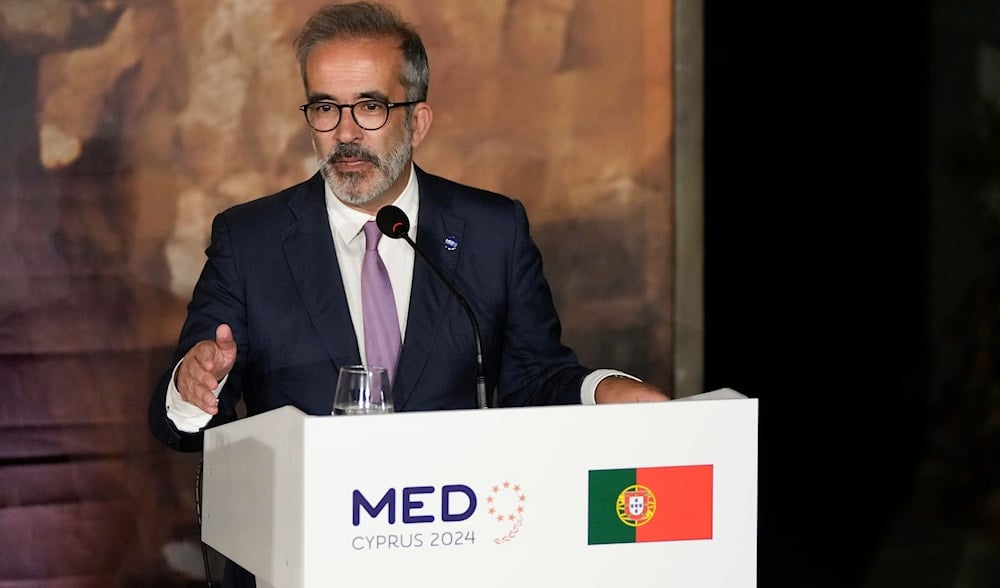Portugal open to recognize Palestine amid divided EU stance
Portugal remains open to recognizing Palestine but emphasizes coordination with EU partners over unilateral moves.
-

Portugal's Foreign Minister Paulo Rangel speaks during a press conference in Paphos,Cyprus, on Friday, Oct 11, 2024. (AP Photo/Petros Karadjias)
Portuguese Foreign Minister Paulo Rangel reaffirmed his country's openness to recognizing the State of Palestine following France's announcement that it will become the first G7 nation to officially recognize Palestine in September 2025.
"Lisbon has shown openness and will remain open to recognizing a Palestinian state," Rangel told reporters on Friday, while emphasizing Portugal's preference for coordinated rather than unilateral action.
He underscored that Portugal is "a sovereign country and its policy is not defined by other states," yet it remains "always coordinated with its partners" in pursuing what he described as "a shared path" with allies on Palestinian statehood.
Portugal is set to participate in the July 28-30 meeting in New York, co-sponsored by France and Saudi Arabia, aimed at advancing a two-state solution to the Israeli-Palestinian conflict.
Portugal's diplomatic position on Palestinian statehood
Portugal's approach reflects a distinct diplomatic strategy aimed at balancing support for Palestinian rights with European Union consensus. Unlike Spain, which recently recognized Palestine through a bilateral move, Portugal appears to favor EU-level or multilateral actions.
Although the Portuguese Parliament has repeatedly called for recognition, the current conservative government insists on further EU dialogue. Portugal has also demonstrated humanitarian engagement, joining 24 nations in condemning Israeli settlement activities, calling for an immediate ceasefire, and providing millions of euros to UN agencies assisting Palestinians.
French President Emmanuel Macron declared that France will officially recognize Palestinian statehood at the UN General Assembly this September, making it the first major Western power and G7 member to take this step.
"Consistent with its historic commitment to a just and lasting peace in [West Asia], I have decided that France will recognize the State of Palestine," Macron stated on social media platform X. He has been encouraging other European nations, including the United Kingdom, Netherlands, and Belgium, to jointly recognize Palestine.
Macron's announcement highlighted key priorities: ending the war on Gaza, securing hostage releases, delivering humanitarian aid, ensuring Hamas's demilitarization, and rebuilding Gaza while establishing a viable Palestinian state.
The EU’s fragmented recognition landscape
As of July 2025, 12 EU countries officially recognize the State of Palestine, underlining a fragmented European approach to Palestinian statehood recognition. The recent wave of recognitions from Western Europe includes Norway, Ireland, Spain, and Slovenia, expanding upon Sweden's 2014 decision as the first from the region.
In contrast, Eastern European nations such as Poland, Hungary, Romania, Slovakia, Bulgaria, Czechia, and Cyprus recognized Palestine after 1988. Outside the EU, Iceland and Mexico stand out as notable Western nations that have formally recognized Palestine.
However, key EU powers like Germany, the United Kingdom, the Netherlands, and Italy continue to oppose unilateral recognition, stressing the importance of negotiations with "Israel". Other holdouts include Austria, Belgium, Denmark, Finland, Greece, and Switzerland. Among Western allies beyond Europe, the United States, Canada, Australia, New Zealand, and Japan also maintain non-recognition stances.
The momentum for Palestinian statehood recognition is nevertheless growing. Belgium, Malta, and Luxembourg have shown openness and may follow France's lead. The United Kingdom's new government has hinted at readiness to recognize Palestine "at the right time" within a negotiated framework.

 3 Min Read
3 Min Read










